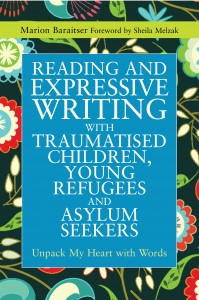In this extract, Marion Baraitser provides activities for both younger and older children in order to explore their feelings of safety and the importance of humour.
‘Reading and expressive writing with traumatised children, young refugees and asylum seekers – Unpack my heart with words’ is available now from the JKP website.
Reconnecting, establishing safety, empowerment with humour
1. Read aloud together Sholem Aleichem’s story On Account of a
Hat (1953). It is about a young man from the shtetl returning
home on a train anxious not to be late for his wife’s celebratory
dinner, who finds to his horror that he has by mistake picked
up the hat of the important official sitting next to him on thestation. Everyone treats him with a deference entirely false to
him. He is forced to return to the station, replace the hat and
arrive home late for dinner, to an enraged wife.
2. Ask the group to talk about their own humorous incidences of
frustration within their everyday lives that involve their need for
finding a safe place.
3. Write about stories they know about how to face dangerous
and frustrating situations realistically, and how to find workable
solutions that give a measure of empowerment.
4. Read these aloud and share.
5. Enact them.
Young children’s group
1. As a warm-up, pass an endearing stuffed animal around the
group, with each child saying how they are feeling and what
they would like to talk about.
2. Create a safe place in the room and ask them to create a pose,
then tap each person to ask them to show and tell the group
what their space looks like, what it contains and what they are
doing there.
3. Ask each person to make sculptures, using ‘characters’ that
threaten them. Then ask them to step away and make changes,
telling their feelings to the group. Or they may create a wax
museum containing characters from their past that reflect their
feelings and situations about a theme such as anger or hate and
the others can walk through it.
4. Enact these ‘characters’. The rest of the group should question them.
Write stories about them.[AQ]
I was on my mettle – after a lifetime spent with literature, I needed to sift and sort the books I knew that were of great truth and impact, to find appropriate texts that applied to, or transformed, traumatised young people’s problems in a way they could absorb and use them effectively. This meant trawling through not only English literature, but also world literature in translation.
